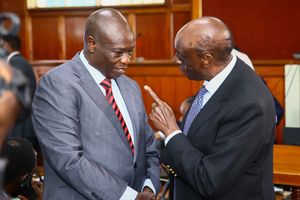CS Namwamba dragged into war for control of Sh6bn music levy

Youth Affairs, Sports and the Arts Cabinet Secretary Ababu Namwamba addresses journalists after appearing before MPs at the National Assembly on August 23, 2023.
A fierce battle has broken out for the control of an estimated Sh6 billion expected to be raised through the new music levy annually.
The fight for the Blank Tape/Media Levy pits collective management organisations (CMOs) against the Kenya Copyright Board (Kecobo).
The Kenya Trade Network Agency (KenTrade) is the state organisation providing a platform for collecting the cash.
The Blank Tape is a nominal fee imposed on the sale of blank media devices such as USB drives, recording kits and smartphones. These gadgets can be used to make copies of copyrighted content.
With Kecobo saying it has already started collecting the levy from September 22, and a case in court temporarily halting the regulator from distributing the funds, a tussle over control of the kitty threatens to get messy.
The Kenya Association of Music Producers (Kamp), the Performers Rights Society of Kenya (Prisk) and Music Copyright society of Kenya have raised concerns, saying Kecobo has no right to control the funds.
In a September 19 letter to Sports and Arts Cabinet Secretary Ababu Namwamba, Kamp sought his intervention to have the CMOs control the kitty.
KAMP argued that Section 28 and 30 of the Copyright Act of 2001, says the duly licensed entities that represent performers and owners/producers of sound recording are Prisk and Kamp.
Says Section 30B: “(1) Subject to provisions of sections 28 and 30 of this Act, the Kenya Revenue Authority or any other designated entity by the Board shall collect royalties on behalf of collective management organisations licensed to represent performers and owners of sound recordings.
(2) All claims for compensation under this section shall be made through the collective management organisations representative of performers and producers of sound recordings.
(3) The level of the royalty payable shall be agreed between the collective management organisation representative of performers and producers of sound recordings and the organisation representative of manufacturers and importers of audio recording equipment, audio blank tape and media intended for recording of failing such agreement by the Board.”
However, in an article in the Saturday Nation last week, Kecobo Executive Director Edward Sigei said the provisions had been changed, placing the responsibility of the Blank Tape Levy on the regulator.
“It (Blank Tape) was introduced by the Copyright Act, 2001. At the time, the responsibility of operationalising collection was entirely on CMOs. This provision of the law was changed in 2019, placing the responsibility on Kecobo. Kecobo undertook this role, enabling the agent to come on board in May 2021,” he wrote.
Apart from the dispute on controlling the huge amounts, the presence of an agent on retainer fronted by Kecobo to collect the funds for distribution – who in turn will be handsomely rewarded by receiving nine per cent of the billions of shillings, is also causing CMOs sleepless nights.
KAMP’s Chief Executive, Maurice Okoth, questioned the presence of the agent, Webtribe T/A Jambo Pay.
“In the public notice on how they propose to share the money, they have sneaked in a nine per cent agency fee of the estimated Sh6 billion. Why does Kecobo want to pay an agency nine per cent of the billions of shillings for doing nothing? We know why and we will challenge it in court,” Mr Okoth said.
“We do not want agents in this process as it is a sensitive matter. With the government approving e-citizen, there is no need for an agent. Why would Kecobo insist on having one?”
KAMP recently terminated its contract with Webtribe T/A Jambo Pay, and communicated the same to Kecobo.
In correspondence dated September 20 addressed to Mr Sigei, KAMP accused Kecobo insisting on having Jambo Pay despite advice from KenTrade that the agent is no longer of importance.
“Kecobo is aware that under a previous agreement, an agent would be required for the payment gateway of Blank Tape Levy. KenTrade has been conducting training, clearly indicating that an agent is not required for the same,” the letter said.
“In light of this, we duly terminated the contract with the agent and there is no basis for inclusion of an agent and/or agency fee. Kecobo’s insistence of this issue leaves us perturbed as to the motive as the regulators should instead ensure that maximum amounts possible are remitted to the right holders. To our chagrin, Kecobo is proposing that the agent receives an even larger share than some right holders. This indeed a first.”
But in a rejoinder the same day, the regulator dismissed the concerns as baseless.
Mr Sigei addressed a number of accusations by KAMP, including violation of the sub judice principle by inviting the public to give views on the proposed share ratio of the levy while there was a case in court.
“I have taken note of your concerns on the sub judice and having read the orders and considering that KAMP is not a substantive party in the case, your concerns are without basis,” Mr Sigei’s letter said.
“On the matter of the contract, please read the effective date and consequences of terminations as per the contract. Furthermore, since Kecobo picked the agent for the CMOs and noting the public interest in the matter, Kecobo has in the meantime stepped in to ensure the rollout is as planned.”
On September 21, Kecobo insisted the regulator had not justified the need for an agent to collect the cash.
“We simply stated that there is no need for an agent. There is no justification to pay an agency fee of nine per cent higher than what right holders will receive,” Mr Okoth said in the letter.
“You have not justified this issue, which is the crux of the matter. Noting that you have declined our request, we now have no option but to proceed to court for determination of the issues raised that will ensure rightful shares are received by our members.”
In the share ratio proposal that is open for public participation, Kecobo says it reviewed Blank Tape levy practices applied in Nigeria, Algeria, Ghana and Malawi and that the regulator is persuaded by approaches taken by Malawi, Nigeria and Ghana.
In arriving at its ratio Kecobo proposes 20 per cent of the Blank Tape Levy remitted to the regulator to go towards administration, advocacy and enforcement.
The nine per cent will be wired to the agent as commission while the remaining 71 per cent will be distributed to artistes.





